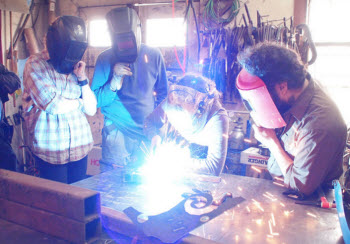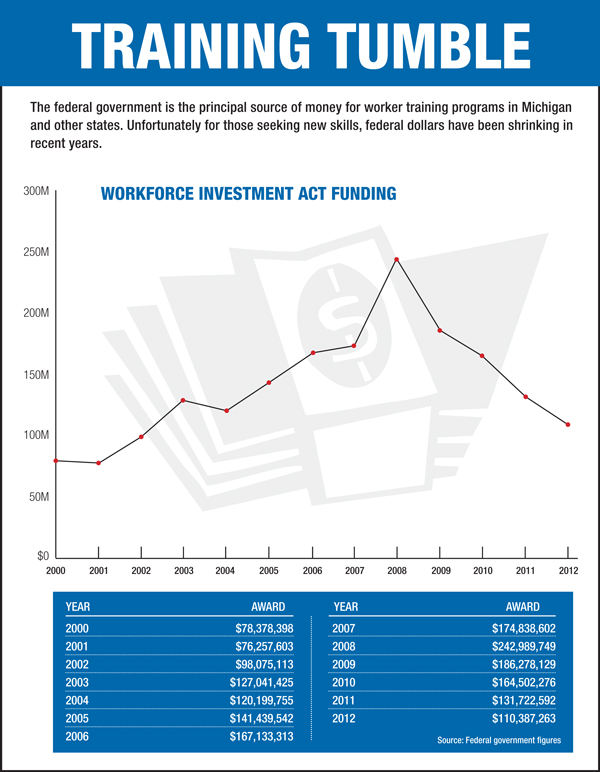Jackson businesses try DIY job-training to create skilled workers
After voters turned down a millage request in 2003, Jackson Community College dropped its skilled trades training program, leaving area manufacturers without a key source of future talent.
So, they decided to do some DIY job training.
Today, the Jackson Academy for Manufacturing Careers is bursting with students training as welders, machinists, computer numerical control programmers, tool-and-die makers and for other jobs in the resurgent manufacturing sector.
“We launched our first welding class in 2005 and we’ve been running flat out ever since,” said Bill Rayl, executive director of the Jackson Area Manufacturers Association, which created the training academy.
The academy, headed by Annette Norris, has about 400 students and runs a number of apprenticeship programs that are certified by the U.S. Department of Labor.
“All of our classes are full,” Norris said.
In most cases, manufacturers are paying for the apprenticeship training and the wages of workers in those programs. Most programs require 8,000 hours of on the-job-training to get a journeyman certification.
Rayl said the talent pipeline started drying up years ago as high schools eliminated shop classes, career and technical centers closed, and companies stopped hiring during Michigan’s recent decade-long economic downturn.
“The whole career and technical education system became stigmatized,” he said. “There was a big emphasis on people getting four-year degrees instead of technical skills.”
Meanwhile, manufacturers failed to project a positive image of the work they were doing and the opportunities they had available.
“Manufacturing became globalized,” Rayl said. “We sort of closed our doors, hunkered down and just did what we needed to do.
“We weren’t transparent,” he said. “Many people drive by manufacturing facilities now and have no idea what goes on inside.”
Today, a lot is going on. And while machines have replaced numerous factory jobs, Norris said there are many jobs that involve operating, programming and repairing those machines.
And those jobs require education and training beyond high school.
Norris said there’s an especially strong need for welders, CNC machine operators and programmers and welders.
“There’s a huge deficit of welders,” she said. We’re running welding classes every second labs are available.”
Skilled welders can make as much as $25 to $30 an hour, she said.
The demand for welders might seem odd to those who’ve been inside an auto assembly plant where robotic welders appear to be doing all the work.
But Norris and Rayl said there are many welding processes that are more efficiently performed by humans. The problem is that many humans stopped becoming welders as demand for them ebbed during the past decade.
“Welding is a trade that died off for a number of years,” Norris said. “People weren’t going into it. The average welder now is in his late 50s.”
But the manufacturers association isn’t just working to fill immediate job openings. It’s working with K-12 schools in the area to inform students about career options in manufacturing and provides training for students who want to enter the work force out of high school.
The association also sponsors an annual manufacturing summer camp for sixth graders.
Rayl said it will take years to raise the status of manufacturing as a viable career option.
“It ‘s going to be a long slog,” he said. “The negative images of manufacturing are fixed in peoples’ minds.”
Business Watch
Covering the intersection of business and policy, and informing Michigan employers and workers on the long road back from coronavirus.
- About Business Watch
- Subscribe
- Share tips and questions with Bridge Business Editor Paula Gardner
Thanks to our Business Watch sponsors.
Support Bridge's nonprofit civic journalism. Donate today.
See what new members are saying about why they donated to Bridge Michigan:
- “In order for this information to be accurate and unbiased it must be underwritten by its readers, not by special interests.” - Larry S.
- “Not many other media sources report on the topics Bridge does.” - Susan B.
- “Your journalism is outstanding and rare these days.” - Mark S.
If you want to ensure the future of nonpartisan, nonprofit Michigan journalism, please become a member today. You, too, will be asked why you donated and maybe we'll feature your quote next time!


 DIY EMPLOYMENT: Welding students practice at the Jackson Academy for Manufacturing Careers, a job-training center started by manufacturers to fill a training gap left by cutbacks in public programs. Welders are in high demand right now and can earn $25 an hour. (courtesy photo/used under Creative Commons license)
DIY EMPLOYMENT: Welding students practice at the Jackson Academy for Manufacturing Careers, a job-training center started by manufacturers to fill a training gap left by cutbacks in public programs. Welders are in high demand right now and can earn $25 an hour. (courtesy photo/used under Creative Commons license)